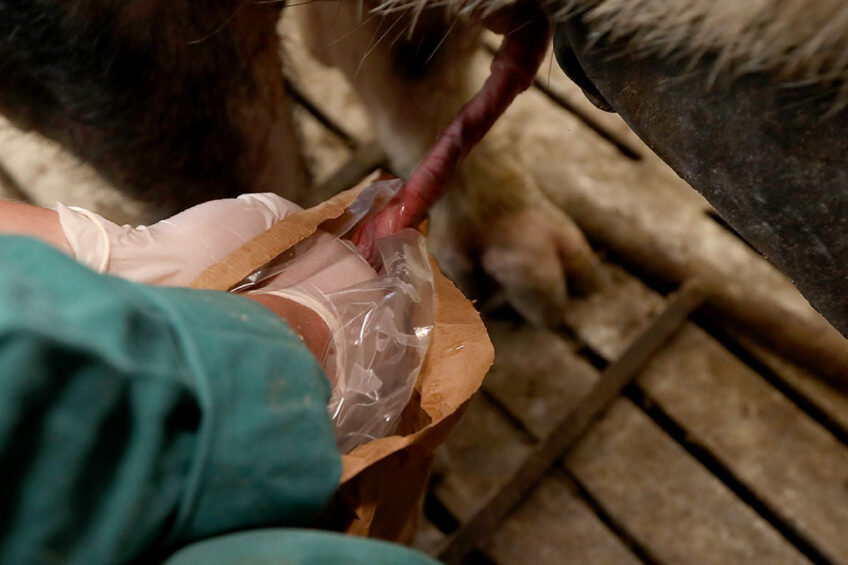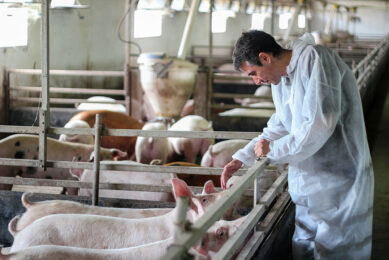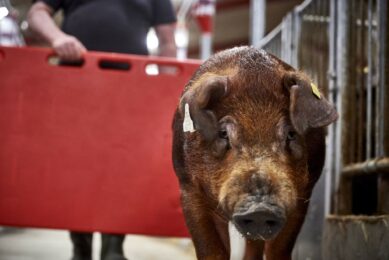Antibiotic reduction during swine AI

Antibiotics are not only administered through needles, feed or drinking water. They are also used to make sure semen is of top-notch quality in terms of pig health. As part of the ongoing push to limit the use of antibiotics, it pays off to look at alternative methods to make sure semen is free from bacterial pathogens.
Artificial insemination (AI) is one of the most applied and effective biotechnologies in pig breeding worldwide. Adding antibiotics to semen extenders – a liquid diluent added to semen to preserve its fertilising ability – is a standard procedure to prevent bacterial growth in semen during the preservation period. However, intensive swine production systems require an increase in sustainable breeding efficiency, while considering environmental, public health and animal-welfare concerns.
Global antimicrobial use will increase to 236,757 tonnes annually
It is predicted that by 2030, global antimicrobial use in both humans and food-producing animals is projected to increase to 236,757 tonnes annually. As a result of increased issues regarding antibiotic resistance, the swine breeding industry seeks strategies to reduce or replace antibiotics in semen extenders without compromising antimicrobial efficiency and sperm quality.
Semen extenders and antibiotics
Use of liquid semen is preferred on-farm due to more efficiency compared with frozen semen. Extenders are applied to provide nutrients and temperature protection for sperm, membrane stabilisation in cool temperature, energy sources for metabolism, pH buffering from cell waste, and ions for membrane and cell balance.
Semen extenders are classified into short-, medium- and long-term preservation both for practical and commercial reasons:
- Short-term extenders maintain the properties of the sperm for 24 hours, and up to 72 hours.
- Medium-term extenders preserve liquid semen for 3 to 4 days.
- Long-term extenders are effective for up to 7 days.
On average, boar ejaculate is loaded with 103–105 CFU/ml of bacteria. In addition, due to the high sensitivity to quality loss caused by cold-shock phenomena, boar sperm are conventionally stored at 16–18°C; therefore, semen doses for AI require antimicrobial agents to prevent bacterial growth.
Environmental cleanliness and frequent bedding change are key factors in the extent of the contamination
Bacterial contamination of boar semen
Environmental and internal bacteria colonise in the boar reproductive tract and transfer to semen during ejaculation. Therefore, environmental cleanliness and frequent bedding change are key factors in the extent of the contamination. Post-collection contamination of semen might occur during processing in the laboratory. Bacteria in the semen compete with sperm for nutrients, produce metabolic by-products and toxins and decrease the shelf life of semen doses. High bacterial growth in AI doses is associated with a decline of sperm quality, reduction of fertility and transmission of pathogens into the sows. Semen extender contains nutrient for sperm, but this is also a favourable environment for multiplication of bacteria.
Replacing antibiotics in boar semen
Several methods can be used to replace traditional antibiotics for boar semen preservation.
One method is the application of substitute antimicrobial substances in extended semen such as porcine myeloid antimicrobial peptides which hardly impairs sperm viability and controls the bacterial load.
Cationic antimicrobial peptides are a second potential candidate to replace common antibiotics in semen preservation.
Short antimicrobial lipopeptides are a third group of promising candidates for antibiotic-free preservation of boar semen, and they show activity towards selected bacteria of potential concern in AI including Trueperella pyogenes; Alcaligenes faecalis; Pseudomonas aeruginosa; Pasteurella species; Providencia stuartii; Escherichia coli and Streptococcus porcinus.
Addition of putative bioactive microalgae to collected semen lacks the broad-spectrum antimicrobial activity; however, they are promising alternatives for bacteria-specific, customisable usage in boar semen extenders combined with antibiotics or other antimicrobial agents.
Furthermore, physical removal of bacteria through single layer centrifugation and microfiltration is used to reduce antibiotics in AI. In this method, the sperm is separated from bacterial contaminants in the semen immediately after collection. It is important to know that the type of bacteria and the length of time between sperm collection and single layer centrifugation processing affect the removal of bacteria.
Another alternative method is antibiotic-free semen storage at low temperature to achieve bacteriostasis. Studies show that preserving sperm in the antibiotic-free extender at 5°C maintains high motility, membrane integrity and a low DNA-fragmentation index throughout 72 hours of storage. Hypothermic semen preservation strategy does not negatively impact fertility traits and reduces bacterial load of semen doses for AI compared to samples stored at 17°C.
Bacteriocins
Moreover, bacteriocins, a heterogeneous group of bioactive bacterial peptides or proteins with antimicrobial activity against other bacteria, added to liquid-preserved semen reduce the abundance of E. coli.
In addition, using antibiotic-free semen extenders with intrinsic antimicrobial activity such as Beltsville Thawing Solution and Androstar Premium allow a reduction in antibiotic use in pig insemination without compromising sperm quality.
Adding iron oxide nanoparticles to boar semen produces minor antibacterial effect with no adverse impacts on sperm characteristics. Combination of silver and iron oxide nanoparticles creates a greater antibacterial effect; however, there is higher spermatotoxicity.
Selenium nanoparticles and zinc nanoparticles are also known to improve membrane integrity of sperm due to the antimicrobial effects.
Lastly, chitosan nanoparticles interact with bacterial cell membranes causing lysis, and ethylenediaminetetraacetic acid (EDTA) increases the permeability of the bacteria cell wall. The combination of chitosan and EDTA has bacteriostatic effect without decreasing sperm quality.
Future challenges of artificial insemination
Extreme use of AI and high reproductive performance require the production of cost-effective, safe semen doses with high fertilising capacity from boars of high genetic value. To decrease the number of sperm needed per sow annually, it is necessary to have gentle semen processing, transport and storage as well as establishment of effective quality assurance.
Extreme climate condition and heat stress during summer negatively impact breeding efficiency; therefore, genetic, management and pharmacological approaches are recommended to decrease seasonal subfertility in boars and sows.
Furthermore, sex-sorted sperm are viable and capable of producing piglets of the desired sex. However, additional effort is required to develop suitable catheters for intra-cervical AI with low numbers of sexed sperm.
Concluding remarks
During semen collection and processing, bacteria transfer to ejaculate and decrease sperm quality and fertility rate. Adding antibiotics to semen extenders reduces bacterial load but facilitates development of bacterial resistance to antibiotics. Therefore, alternative methods to replace traditional antibiotics for boar semen preservation are necessary. Furthermore, it is crucial to align research with bioeconomy in AI to promote economic growth and to improve environmental impacts and pig welfare.
Join 18,000+ subscribers
Subscribe to our newsletter to stay updated about all the need-to-know content in the pigsector, three times a week. Beheer
Beheer










 WP Admin
WP Admin  Bewerk bericht
Bewerk bericht